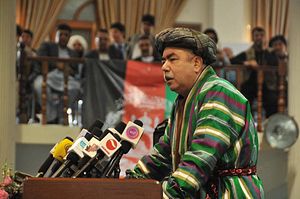The absurd story of Afghan Vice President Abdul Rashid Dostum beating up and abducting his rival, Ahmad Ishchi, at a late-November buzkashi match in Kabul has taken on a steadily darker tone. To be clear, the story is absurd because the literal acting president of Afghanistan (President Ashraf Ghani was out of the country at the time) physically assaulted someone in public — so much for rule of law.
Ishchi says he was tortured in Dostum’s “private prison” — including severe beatings and rape with a Kalashnikov rifle — for five days and then handed over to local intelligence, who held him for 10 days before releasing him.
A spokesperson for Dostum said in a statement that Ishchi “was detained by Afghan security forces for allegations of funding the opposition and having a hand in repeated security issues.”
As I noted when the kidnapping story broke:
The order of operations is a bit hazy. If Ishchi was arrested on charges as Dostum claims, were they issued before or after the fight at the buzkashi match? Was Dostum micromanaging the arrest as he has at times micromanaged army operations in northern Afghanistan? Or rather, did Dostum fly off the handle and retroactively need a legal reason for locking up Ishchi?
Ishchi denies that he has links with insurgents, telling the LA Times, “If I have any links with insurgents, the government is welcome to trail me.”
The Dostum statement went on to add that, “For some time there has been a destructive movement by some unknown circles against the First Vice President.” The statement essentially posited Ishchi’s claims as an attempt to defame Dostum.
The “he said, he said” battle will rage on. The New York Times and LA Times cite witness to the kidnapping at the buzkashi match but the NYT notes that it could not independently verify Ishchi’s torture accusations. Ishchi says Dostum’s men took pictures of the torture in progress; Dostum denies everything.
The Afghan government has promised a thorough investigation.
International bodies like the United Nations Assistance Mission in Afghanistan (UNAMA) welcomed the announcement of an investigation, saying in a statement “UNAMA is concerned about these allegations, stresses the importance of due process and accountability, and remains committed to working with the Government and people of Afghanistan in their efforts to strengthen respect for human rights and the rule of law.” A number of Western embassies in Kabul echoed the sentiment that Ishchi’s accusations need to be fully investigated. The U.S. Embassy welcomed Ishchi’s release and said in a brief statement, “The unlawful detention and reported mistreatment of Mr. Ishchi by the First Vice President raises serious concerns.”
As Tolonews reports, while a number of parliament members support an investigation there are others who have come out in support of Dostum’s version of events.
Abdul Raouf Enami said, “This is a sensitive issue and it is better for both sides that the issue should be probed by judicial centers without any interference.” He went on to comment that there are forensic processes which can prove and verify what happened. “The allegations made against Dostum brings Afghanistan’s reputation into question. If these are wrong, Dostum’s reputation should be restored but if they prove to be true, government’s legitimacy will decrease.”
Dostum has been Afghanistan’s vice president since 2014 and has a violent and checkered past, which includes allegations of war crimes.

































